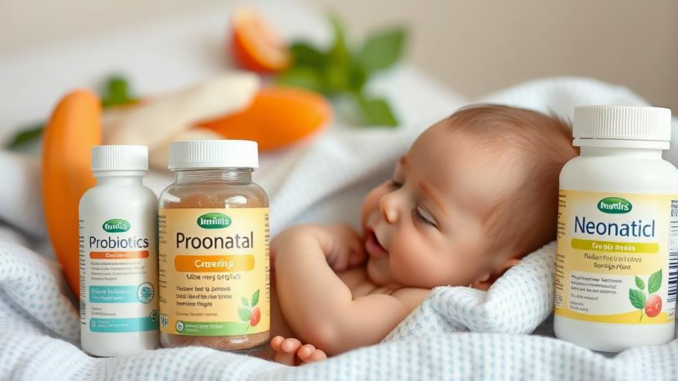
Summary
Probiotics show promise in reducing preterm infant deaths in Canadian neonatal units, offering a potential breakthrough in neonatal care. However, careful selection and administration of probiotics are crucial due to potential risks. Further research will refine best practices and expand the benefits of this promising intervention.
Gain peace of mind with TrueNASs 24/7 support from healthcare data storage specialists.
** Main Story**
Tiny Organisms, Huge Impact: Probiotics Show Promise in Reducing Preterm Infant Deaths in Canadian Neonatal Units
Preterm birth, occurring before 37 weeks of gestation, poses significant challenges for newborns, with increased vulnerability to infections and developmental complications. A promising new frontier in neonatal care involves the use of probiotics – live microorganisms that, when administered in adequate amounts, can confer health benefits. Recent studies, particularly in Canadian neonatal units, suggest that probiotics may play a crucial role in reducing mortality rates among preterm infants.
Probiotics and Preterm Infant Health: A Growing Body of Evidence
The delicate gut microbiome of preterm infants plays a vital role in their overall health. Probiotics can help establish a healthy balance of beneficial bacteria in the gut, bolstering the immune system and protecting against harmful pathogens. Studies have shown a correlation between probiotic use and a decrease in necrotizing enterocolitis (NEC), a devastating intestinal condition common among preterm infants. Furthermore, probiotics may reduce the risk of sepsis, a life-threatening infection.
Canadian Neonatal Units Leading the Way
Canadian neonatal units have been at the forefront of research exploring the benefits of probiotics for preterm infants. Several studies conducted in Canada have demonstrated a significant reduction in mortality rates among preterm infants receiving probiotics. These findings have contributed to the growing body of evidence supporting the use of probiotics as a preventative measure in neonatal intensive care units.
Navigating the Challenges and Ensuring Safe Practices
While the potential benefits of probiotics are substantial, it’s essential to proceed with caution. The FDA has issued warnings regarding the potential risks associated with probiotic use in preterm infants, particularly those with extremely low birth weights. Careful selection of probiotic strains, appropriate dosage, and meticulous administration are crucial to minimize the risk of adverse effects. Ongoing research and rigorous clinical trials are essential to refine best practices and ensure the safe and effective use of probiotics.
The Future of Probiotics in Neonatal Care
The promising results observed in Canadian neonatal units have generated considerable excitement in the medical community. Further research will focus on identifying the optimal probiotic strains and dosages for preterm infants, as well as developing standardized protocols for administration. As our understanding of the complex interplay between probiotics and the developing gut microbiome grows, we can expect to see even more refined and targeted probiotic therapies.
Beyond Mortality: Probiotics and Long-Term Health
The potential benefits of probiotics extend beyond reducing mortality rates. Studies suggest that early exposure to probiotics may have long-term positive effects on infant health, including improved digestive function, enhanced immune response, and reduced risk of allergies and autoimmune diseases. As research continues, we may discover even more ways in which these tiny organisms can have a profound impact on the health and well-being of preterm infants.
The Promise of Personalized Probiotic Therapies
Advances in genomic sequencing and personalized medicine offer exciting possibilities for tailoring probiotic therapies to individual infants. By analyzing an infant’s gut microbiome, healthcare providers can identify specific bacterial strains that may be beneficial or detrimental. This personalized approach may lead to more effective and safer probiotic interventions, maximizing the benefits while minimizing potential risks.
Collaborations and Knowledge Sharing
The ongoing research on probiotics in neonatal care requires collaboration between researchers, clinicians, and regulatory bodies. Sharing knowledge and best practices across institutions and countries will accelerate the development and implementation of safe and effective probiotic therapies for preterm infants. The promising results observed in Canadian neonatal units represent a significant step forward in our quest to improve the health outcomes of these vulnerable newborns.


Probiotics saving the day, eh? I bet those tiny organisms are now demanding hazard pay and miniature lab coats. Seriously though, this is fantastic news! Who knew bacteria could be such heroes?
Haha, hazard pay for probiotics! Love that thought. It’s amazing how something so small can make such a big difference. Hopefully, more research will give us better understanding, so we can ensure all babies benefit from these tiny heroes. Appreciate your comment!
Editor: MedTechNews.Uk
Thank you to our Sponsor Esdebe
So, if we start personalizing probiotics based on gut biomes, will we need tiny therapists for those bacteria who feel left out in the mix? Just imagine the existential dread of a *Lactobacillus* facing obsolescence!
That’s a hilarious and insightful point! The thought of probiotic obsolescence is something I hadn’t considered. Personalization raises fascinating ethical questions – even for our microbial friends. Maybe we’ll need a ‘bacterial bill of rights’ someday! Thanks for sparking that creative thought.
Editor: MedTechNews.Uk
Thank you to our Sponsor Esdebe